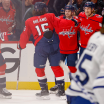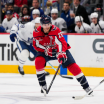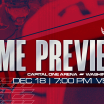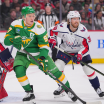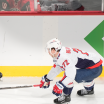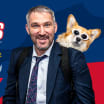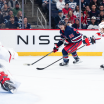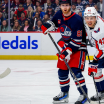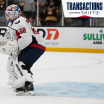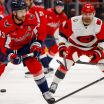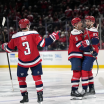On the penultimate day of 2022, ex-Caps winger Devante Smith-Pelly created and posted a heartfelt Instagram post to announce his retirement as a pro hockey player. Like every other member of Washington's first Stanley Cup championship team from 2017-18, Smith-Pelly will always be bonded tightly to D.C., and the District was his final NHL stop in a career that spanned nearly 400 regular season games. But Smith-Pelly's career also included three other NHL cities and a season playing in the KHL for that League's China-based team.
DSP Returns to D.C.
Ahead of trip to DC to help celebrate Caps' Black History Night, recently retired Smith-Pelly reflects on his career
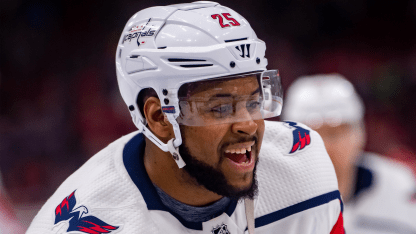
By
Mike Vogel
WashingtonCaps.com
When it was all said and done and Smith-Pelly decided to call it a day, one word kept popping up. It showed up twice in the first paragraph of his Instagram post, and it was three of the first four words out of his mouth when we recently asked him to reflect on a career that took him around the continent and the world, made him a Stanley Cup champ, and enabled him to fulfill a lifelong dream.
"Grateful, grateful. Really grateful," says Smith-Pelly. "When I announced it, so many of the ex-teammates and ex-coaches and people that I got to meet all along the way, they reached out. I'm just grateful that I was able to fulfill my lifelong dream of playing. Obviously, my dream was to play one game, but I ended up playing almost 400 and winning the Stanley Cup. But I'm just grateful and I wouldn't change it for the world."
Even playing one game in the NHL would have made for some wild stories for Smith-Pelly. As a second-round pick (42nd overall) of the Anaheim Ducks in the 2010 NHL Draft, Smith-Pelly made the Ducks' roster as a teenager in the fall of 2011, and he made his NHL debut in Anaheim's season-opening contest for 2011-12.
That was the season that the Ducks opened with a pair of games in Europe, facing Buffalo in Helsinki and then taking on the Rangers in Stockholm the following night. Smith-Pelly's NHL debut came halfway around the world from Southern California, and his parents weren't able to to be there.
"No, they weren't able to make it," he sighs. "I'm probably one of the only people that played their first NHL game and that knew they were going to play it, but didn't have their parents there. It was obviously crazy. At that point, I had never been to Europe. So it was my first time in Europe, and I'm playing my first NHL game, getting to play in Finland with Teemu Selanne, a legend.
"I got to do a lot of really cool and special stuff. I don't think a lot of people got to do some of the things I did, like playing in China, starting my NHL career in Europe, playing in World Juniors and stuff like that. I got to do a lot of great things and a lot of things that I'm proud about."
Making that Randy Carlyle-coached Anaheim team as a 19-year-old was no small feat, either. One of the calling cards of Smith-Pelly's career was his ability to rise to the occasion when the games mattered the most; he always stepped up his game and his scoring rate in the playoffs, and that was true in his final junior season too, when he piled up 15 goals and 21 points in 20 Memorial Cup playoff games with Mississauga St. Michael's in the spring of 2011. That was his springboard to the NHL.
"I think the year prior in junior [hockey], I had a good playoff and a good Memorial Cup run, and was kind of dominant in that sector of the season," says Smith-Pelly. "So I guess they just thought that I was ready. Going into training camp, I hadn't heard anything like, 'You have a chance to make it,' or anything like that. I was just going in and putting my best foot forward and hoping for the best. I went into camp as an 18-year-old with the same mindset, that I'm trying to make the team. And I guess they thought I was just ready to do it the year after."
With the Ducks, Smith-Pelly's career experienced some fits and starts. He spent some time in the AHL cities of Syracuse and Norfolk, putting up 27 goals in 55 games with the latter club in 2013-14. With the Ducks that same season, Smith-Pelly totaled just two goals and 10 points in 19 games. But when springtime rolled around and he got his first taste of the Stanley Cup playoffs, he opened some eyes.
The Ducks' playoff run lasted two rounds that spring, and Smith-Pelly skated in 12 of the team's 13 games. But his five goals not only more than doubled his regular season output in fewer games, it led the team, a team with players such as Selanne, Ryan Getzlaf, Corey Perry, Patrick Maroon and Kyle Palmieri.
"It's hard to explain but I think I can say now that I'm not playing that the regular season is a hard drive," opines Smith-Pelly. "You're not playing on the power play, and you're not getting a lot of [offensive] zone starts, so you can't just coast through it and pick up points. And you also can't play the way we played in the playoffs all year, so it's kind of hard to explain. But in the playoffs, it's do or die. Everything is on the line, and you always have a chance no matter if you're the first seed or the eighth seed, you have a chance. It's just a whole reset. You start all over at the start of the playoffs. It's a reset, and you forget about the regular season and do what I need to do to be able to help the team. And in those two rounds, it just so happened that it was goal scoring."
After stops in Montreal and New Jersey, Smith-Pelly came to Washington as a free agent in the summer of 2017. The Devils bought out his contract, and the Caps swooped in to sign him as they've done so often in recent years, grabbing a player who was chosen in the first round or two of a recent NHL Draft, but who hadn't quite solidified his position and standing at previous stops
around the circuit. Brett Connolly and - more recently - Dylan Strome and Sonny Milano also arrived here under similar circumstances.
Smith-Pelly played in 129 games with Washington - the same number he played with the Ducks - tied for his most games with any of his four NHL clubs. But it was with Washington that Smith-Pelly was again able to display his remarkable postseason prowess, scoring seven goals while skating in all 24 postseason games in the spring of 2018 as he helped push the Caps to the first Stanley Cup championship in franchise history.
Smith-Pelly's total of seven postseason goals that spring was achieved despite playing on the Capitals' fourth line and averaging 12 minutes a night in ice time. But by the time the Cup was hoisted in Las Vegas on the night of June 7, 2018, only Alex Ovechkin (15), Evgeny Kuznetsov (12) and T.J. Oshie (8) had scored more playoff goals for Washington than Smith-Pelly. And the last of his 13 career Stanley Cup playoff goals was the biggest; it tied Game 5 midway through the third period, setting the table for Lars Eller's game-winner a few minutes later.
Playing the right side of a relentless fourth line with Chandler Stephenson - an NHL All-Star at last weekend's All-Star festivities in South Florida - on the left and Jay Beagle in the middle, Smith-Pelly gave the Caps one of the best fourth lines in the game that spring. The trio combined for 11 goals in those 24 games, and few fourth lines can deliver a goal every other game.
"I mean, those guys were so easy to play with," says Smith-Pelly. "You know what you're going to get from Beags; he's going to win the draw, so you're going to start with the puck the majority of the time. He's going to try and be the first guy in on the forecheck, so you can kind of just read off him and go to your spots because you know for sure he's going to be covering you on the way back as well.
"And with Stevie, I love that he just refuses to shoot so he always wants to make a play. So that was good for me, especially in the playoffs. He just always wanted to look for one of us, and all we had to do was try and put it in. And Stevie was just as good then as he is now. I'm not surprised that he is an All-Star, and I'm not surprised at how well he is doing. It was good to have a guy with that skill on our line."
Smith-Pelly had his day with the Cup in August of 2018, and his first stop was SickKids, Toronto's Hospital for Sick Children. Later, he had a backyard luncheon at a friend's house where ex-Caps winger Mike Marson - just the second Black player in NHL history - was in attendance. Following that, the Cup went to Smith-Pelly's hometown of Scarborough for a meet and greet at a local restaurant, and he concluded the night with a party in downtown Toronto.
"I think I had as perfect a day for me as I could have," he reflects. "I had the Children's Hospital which is something I always wanted to do, just to brighten up the day of kids who are going through a hard time. And then I had the community thing in Scarborough where kids could come out and see the Cup, touch the Cup, take pictures and hang out. And then I did my adults and family party after that. It was a long day, but I think I broke it up just about as perfect as I could."
As Smith-Pelly and the Cup were making their way to Scarborough, the skies opened up and it began pouring, putting an obvious damper on an outdoor event at the city's Black Dog Pub. But people who are excited to see the Cup aren't concerned with precipitation. Even in a heavy rain, the line to meet Smith-Pelly and spend a minute in the Cup's - and the Cap's - presence stretched around the block.
"When it started raining while we were on our way," Smith-Pelly recalls, "I was just like, 'Aw man, this is going to be such a dud because of the weather and stuff.' But when we turned the corner and saw everyone, I was extremely happy and excited about that."
Smith-Pelly's final NHL season was 2018-19, but his career didn't end there. On Oct. 26, 2019, he signed on to play for Kunlun Red Star, the China-based entry in Russia's KHL. The Red Star began operation in 2016-17 and had churned through five different coaches in three seasons before Smith-Pelly's arrival for its fourth season of existence. To this day, the Red Star has made the playoffs just once, in its first season. But given its lack of geographical proximity to the rest of the teams in the KHL, that's no surprise.
"The travel was bad," says Smith-Pelly. "I think our shortest flight was about eight or nine hours to get to the closest team, so the travel was a bit much. But it's just like any other team, you get to hang out a lot more and bond with the guys on the team. And you bond on the airplane for as long as it's up in the air, so it's just like any other team but the travel was tough. That year, we actually had a good team on paper, but I think the travel kind of caught up to us and put us behind the eight ball when we were trying to chase a playoff spot."
Smith-Pelly spent one season with Kunlun, which was coached by ex-NHL player and bench boss Curt Fraser. The team was filled with North American players who spoke fluent English and dotted with just a few Europeans, including former Caps forward Wojtek Wolski. Peter Bondra's son David also skated in 18 games for the Red Star that season, sporting his father's familiar No. 12.
"That made it a lot easier," says Smith-Pelly. "The coach was from North America and all of the players spoke English and were from North America. And so I'm going over there blind; I don't really know how it works. And a lot of the guys there, it was their first time in Russia and China as well, so we were all figuring it out together, and there was no language barrier. And if I needed help, I could also reach out and figure it out. That also made the experience pretty good as well.
"Getting a chance to go to China, like who would have thought I would ever get a chance to go over there? Living in downtown Beijing and trying to absorb the culture, and in trying to grow the game there ahead of the Olympics and being involved in all that, it was fun. And off the ice, I got to travel to places I wouldn't have seen otherwise. I went to South Korea for a vacation and I went to Dubai for a vacation, and those are places I can't go to on an NHL bye week. I got to see the world and go to places that who knows if I would ever get there otherwise."
What's next for Smith-Pelly, now that he has announced his retirement? A recent Caps road trip to Toronto to take on the Maple Leafs provided a possible clue. Before the Sunday afternoon game started, television monitors in the press box showed Smith-Pelly in studio, speaking on camera about the upcoming contest.
"The last couple of weeks, I've just been hanging out and relaxing," he says. "I'm starting to get a little bit bored, so I'm kind of looking at different things to do. I obviously want to continue helping the youth, whether that is me going on the ice or talking or anything like that; it's always something I do want to do. The other day I did a little on TV hit with TSN and had a lot of fun. So that could be something that that works, too. Just something in hockey, and spreading my knowledge and trying to help the next generation to make this game that I enjoyed playing, and make it the best it can be."
When Smith-Pelly was still just a kid dreaming of the NHL, he worked out with Marson, who trained young hockey hopefuls for years in the Toronto area. But even as a young Black kid aspiring to the NHL, Smith-Pelly didn't really understand who Marson was or what he had been through in the mid- to late-'70s when he was, for a time, the only Black player in the NHL and the first since the legendary Willie O'Ree more than a decade earlier.
"I used to workout with Mike when I was a kid, he used to train me and a couple of guys on the team," recounts Smith-Pelly. "And I don't even honestly even know if back then I knew his story. I was a kid, right? I would have been like nine or 10. It's funny how I don't even know if I knew his story, or if I knew he played for the Caps. I don't even think I figured that out after, so it's kind of funny how it worked out."
Marson was a mentor for many along the way, and Smith-Pelly mentions him and others when asked about those who had a positive influence on him and his career.
"When I was younger, I had no idea who he was," he says of Marson. "We just wanted to train. That's what we were doing, we were training. I had no idea of his whole story but as I got older and I saw him around more and I got more of an understanding, we definitely talked, and I definitely heard stories of what he had to go through. He's obviously one of the pioneers and things like that are still happening, but he was one of the first guys to do it and help make it kind of almost a regular thing, and to make it acceptable that he could play. Without guys like him, all the guys who came before me and me, we wouldn't be able to play the game."
"We don't obviously talk as much now, but Mike will send me a text every once in a while, and we'll have a little chat. But obviously the Stewart brothers [Anthony and Chris], Wayne Simmonds and another former Cap, Joel Ward, those guys were from the same era. When Chris and Wayne used to live together down here, I used to ride my bike to their house, and they used to drive me to workout. I would hang out there all day and stuff like that. Seeing it firsthand, guys from the neighborhood being successful and making it to the top definitely had a big influence on me. You know, obviously when I was younger, I was pretty good. But if those guys weren't involved in my life, I don't know if I would have been able to get to the level I did."
That's where Smith-Pelly's drive to have a positive impact on the next generation of young players comes from. He is quite literally connected to the past history of Black players in the NHL, and he wants to be a part of it in the years ahead, too.
"I think it's a must," he says. "It's paying it forward, and like I said, without those guys, who knows how my career would have gone? I think it's only right to help the next generation of players from not only Scarborough, but anywhere, be a good influence.
"On my way out, I got to play in [AHL] Ontario [in 2020-21] with [Quinton] Byfield and Akil Thomas, and I made it a point to kind of try and help them out, mentor them like those guys did for me. Obviously not too much, and nothing forced, but if they ever need anything - and still to this day if they need anything - they do call me and they do text me, and I kind of talk them through whatever they need. So I'm just trying to help the way I was helped."
During his own career, Smith-Pelly endured many sad, ugly and unfortunate racial incidents. One of his priorities in retirement is to help educate and enlighten, and he will be making a special trip back to the District later this month to help the Caps celebrate Black History Night ahead of a Feb. 25 game against the New York Rangers, when he participates in a ceremonial puck drop.
"It's a tough question, and I don't have all the answers," he says of the ongoing issue of racism at all levels of hockey. "I think in hockey specifically, you're cutting out a large amount of people just by not being inclusive. I wish I had the answer. But I think at this point it might just start with education and stuff like that when kids are young.
"The older generation is stuck in its ways, and it's kind of tough to change those people. But if we start with education and being inclusive at a young age, then it won't be so foreign for kids when they get older and start seeing different things. I don't have any real answers, but those are my thoughts. It's going to take a couple of generations to get there, but my thought is to start young with the knowledge and make sure everything is inclusive from a young age. And when people start moving on and going to different places and they see someone that looks different, it's not a shock. It's just normal."
For Smith-Pelly, retirement is the new normal. But just as he found his way to a prosperous NHL career, we're sure he'll make a significant splash in retirement as well, because his heart is always in the right place. And it'll be great to see him and his heart here in the District later this month, where he'll always be welcomed with open arms.
D.C. will always be grateful for DSP.

